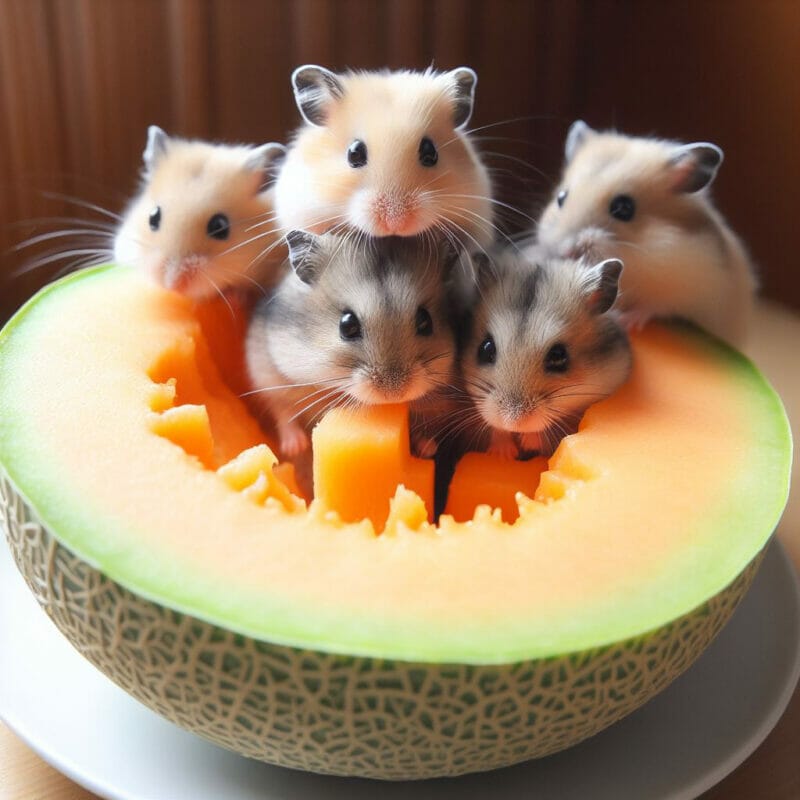Cantaloupe is a type of melon packed with nutrients like vitamin A, vitamin C, potassium, and folate. It’s made up of mostly water and natural sugars. Can hamsters eat Cantaloupe? While cantaloupe can be part of a balanced hamster diet, it does come with some risks. We’ll explore the pros and cons so you can make an informed decision about this fruit.
Introducing Cantaloupe
Cantaloupe is a orange-fleshed melon that belongs to the Cucurbitaceae family along with other melons like honeydew and watermelon. It contains high amounts of water, vitamin A, vitamin C, potassium and smaller amounts of B vitamins and minerals. Can hamsters eat Cantaloupe? The soft orange flesh provides natural sugars like sucrose, fructose and glucose.
The main nutritional components in 1 cup of cantaloupe include:
- 60 calories
- 14 grams sugar
- 89% water
- 120% DV vitamin C
- 108% DV vitamin A
- 12% DV potassium
- 3 grams fiber
- Small amounts of calcium, iron and B vitamins
Can Hamsters Eat Cantaloupe?
In short – yes, hamsters can eat cantaloupe but only in very small quantities as an occasional treat. Cantaloupe has a high water and sugar content that can cause diarrhea if overfed. The seeds and rind should also be avoided due to choking hazards.

Can hamsters eat Cantaloupe? Cantaloupe can be offered to hamsters 1-2 times per week in tiny servings about the size of a sunflower seed. Any more than that may be too much sugar and fluids for their small digestive systems. It’s best to introduce new foods slowly and watch for signs of diarrhea or tummy troubles.
Benefits of Cantaloupe for Hamsters
Eating a tiny amount of cantaloupe can provide some nutritional benefits for hamsters:
- Excellent source of vitamin C to support a healthy immune system. Cantaloupe contains 120% of the daily recommended value per cup.
- Good source of vitamin A (from beta-carotene) to promote good vision, growth and coat health.
- Provides potassium, an electrolyte mineral for nerve and muscle function.
- High water content helps keep hamsters hydrated.
- Small amounts of B vitamins involved in energy metabolism.
Can hamsters eat Cantaloupe? The vitamins, minerals and natural sugars in cantaloupe can give hamsters a beneficial nutritional boost when fed occasionally and in moderation.
Risks of Feeding Cantaloupe to Hamsters
While cantaloupe can provide some nutrition, there are also some risks to be aware of:
- High sugar content – Too much can cause obesity and diabetes if overfed.
- High water content – Can lead to diarrhea or digestive issues.
- Possible choking hazard from seeds and skin.
- May cause allergic reaction in sensitive hamsters.
- High potassium levels could be problematic for hamsters with kidney disease or diabetes.
Can hamsters eat Cantaloupe? Overfeeding cantaloupe could also lead to an unbalanced diet if it takes the place of other crucial hamster foods like pellets and hay. Owners should limit cantaloupe to only 1-2 small pieces per week.

Signs of Cantaloupe Poisoning in Hamsters
Can hamsters eat Cantaloupe? Eating too much cantaloupe could cause signs of a minor toxicity or allergic reaction in hamsters such as:
- Diarrhea or very loose stool
- Reduced appetite or disinterest in other foods
- Increased thirst or lethargy from dehydration
- Abdominal cramping or pain
- Oral irritation from contact with skin or seeds
Can hamsters eat Cantaloupe? If any of these symptoms occur after feeding cantaloupe, stop providing it immediately and contact your exotic vet if symptoms persist more than 24 hours.
Recommended Cantaloupe Serving Size for Hamsters
Hamsters only require the tiniest taste of cantaloupe 1-2 times per week at most. Here are some serving size guidelines:
- Syrian hamsters – A bite-sized piece about 1/2 inch square
- Dwarf hamsters – A tiny pinch the size of a sunflower seed
Can hamsters eat Cantaloupe? Ideally cantaloupe should make up no more than 1-5% of the total weekly diet. Any more can throw off the ideal nutrition balance.
A healthy daily diet for a hamster with the occasional cantaloupe treat could look like:
- High-quality hamster pellets – 1-2 teaspoons
- Timothy hay – Unlimited
- Veggies – 1-2 teaspoons
- Fruits like cantaloupe – Tiny piece 1-2x/week
- Lean protein – Occasional tiny portions
- Clean water – Unlimited
Alternatives and Supplements
Other fruits hamsters can eat in moderation include:
- Blueberries – Antioxidants
- Raspberries – Fiber
- Apple – Low acidity
- Pear – Vitamin C
- Strawberry – Vitamin C
- Banana – Potassium
- Watermelon – High in water

High quality hamster food brands include:
- Oxbow Essentials Hamster & Gerbil Food
- Kaytee Forti Diet Pro Health Hamster Food
- Supreme Petfoods Science Selective Hamster Food
- Small Pet Select Hamster Food Pellets
- Mazuri Rat and Mouse Diet
Can hamsters have cantaloupe?
Yes, hamsters can eat small portions of cantaloupe as an occasional treat.
Should I consult my vet before feeding cantaloupe to my hamster?
It’s a good idea to check with your exotic vet when introducing any new foods to your hamster’s diet.
What are symptoms of cantaloupe poisoning in hamsters?
Diarrhea, loss of appetite, increased thirst, lethargy, cramping, and oral irritation can be signs a hamster has eaten too much cantaloupe.
How should I introduce cantaloupe to my hamster?
Start with a tiny piece the size of a sunflower seed and gradually increase to 1/2 inch square pieces for Syrians.
Can Syrian hamsters eat cantaloupe?
Yes, Syrians can have small, bite-sized pieces of cantaloupe as a treat.
Can Roborovski hamsters eat cantaloupe?
Roborovskis can have tiny portions of cantaloupe the size of a seed, but monitor closely.
Can Russian dwarf hamsters eat cantaloupe?
Russian dwarfs can eat seed-sized amounts of cantaloupe in strict moderation.
Can Teddy bear hamsters eat cantaloupe?
Teddy bears can have tiny portions of cantaloupe no more than 1-2 times per week.
Can Chinese dwarf hamsters eat cantaloupe?
Chinese dwarfs can have very small amounts of cantaloupe as an occasional treat.
Can dwarf hamsters eat cantaloupe?
Yes, but dwarf hamsters should only eat tiny pieces of cantaloupe, about the size of a seed, 1-2 times weekly.
Can hamsters eat Cantaloupe? If you take the time to educate yourself about hamster care and respect your pet’s personal space while also giving it adequate hamster breed, hamster food, exercise, and entertainment, as well as maintaining a clean environment and good health, you and your hamster should enjoy a long and happy life together. Visit our site http://hamstercare.net/
